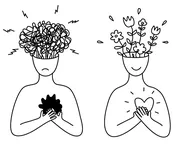Human beings have a remarkable ability to be inconsistent. So often there are gaps between what we believe and what we feel.
Maybe you’ve noticed it: that ability to assert confidently that Jesus is sovereign and yet still feel everything is out of control; that desire to thank God for his sufficient grace and yet still feel unendingly guilty; or that conviction of adoption as precious children sitting alongside a repeated suspicion that we are alone, unloved and unable to change.
Of course, such a dichotomy between our confessional theology and our functional theology impacts more than our emotions, it undergirds much of our behaviour too. Addicts can know they are free, but still run back to their slave-masters. Christians may rejoice in the call to purity and yet fall into sexual sin. Such struggles are sometimes down to bad doctrine or intentional rebellion but, in many a faithful church, people believe good doctrine and, in many ways, want to live it out – but there’s a problem: they’re still listening to other beliefs more.










